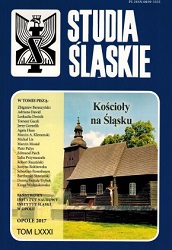Życie kościelne ewangelickich Serbołużyczan w ramach wrocławskiego Konsystorza Ewangelickiego w czasach republiki weimarskiej
The church life of the evangelical Sorbs under the Evangelical Consistory of Wrocław in the times of the Weimar Republi
Author(s): Edmund PjechSubject(s): History, Ethnohistory, Interwar Period (1920 - 1939)
Published by: Instytut Śląski
Keywords: The Sorbs;the Evangelical Consistory of the Silesian Church Province;evangelical Protestants;Upper Lusatia;;
Summary/Abstract: In the Prussian part of Upper Lusatia after World War 1, seventeen evangelical parishes still had a bilingual character, and in nine parishes the majority of the inhabitants spoke the Sorbian language. Considering this fact, in the 1920s the Consistory in the city of Wrocław, where the Sorb population was prevalent, used to confer the offices of parsons and cantors to the Sorbian-speaking candidates. Those parishes stood out against the German background for their piety and the regular participation of the youth at the Sorb Holy Mass on Sundays. The Consistory perceived the relationship between the piety and the condition of the national consciousness. At the turn of the 1930s, the problem of vacancies became more and more acute. In addition, the Sorbian language competence in the young generation was deteriorating. The reports of inspections indicated still other problems that tormented the local communities, such as alcoholism, promiscuity and laziness, qualifying them as Sorb national features. Nonetheless, in other regions of Germany, such as Mecklenburg, parishes had to face almost the same problems. A conclusion follows that the related state of affairs had a social background rather than national.
Journal: Studia Śląskie
- Issue Year: 2017
- Issue No: 81
- Page Range: 179-186
- Page Count: 9
- Language: Polish

